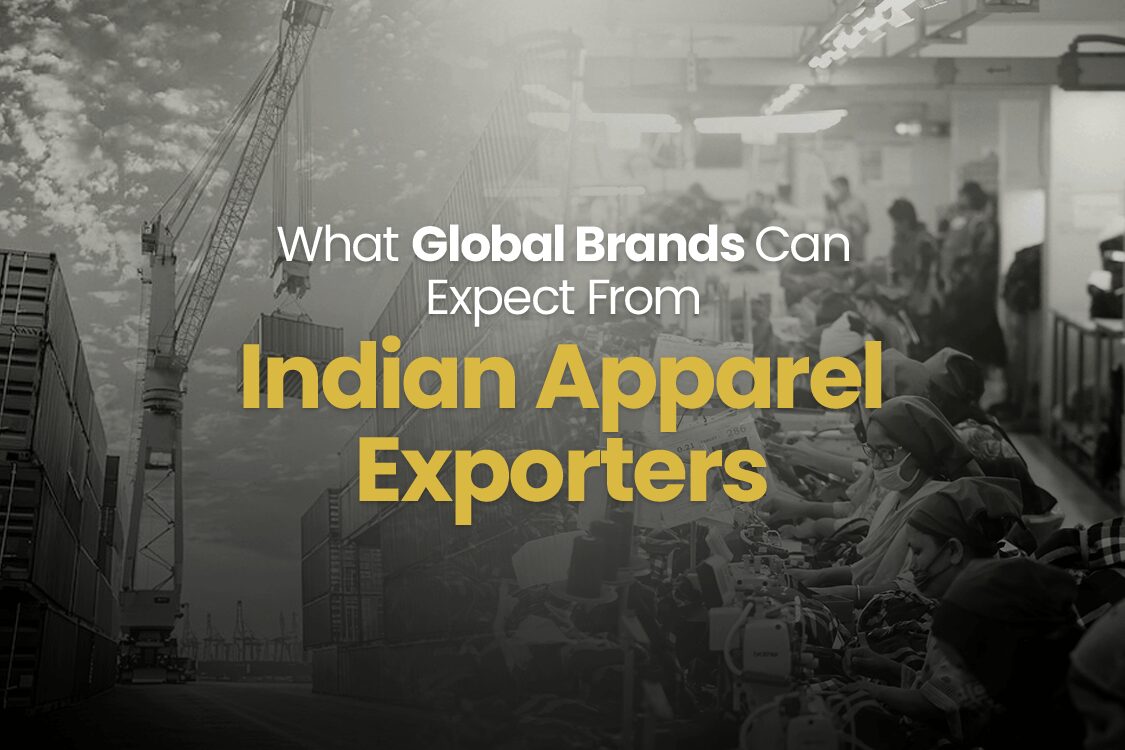Main Topics Covered● Evolving Expectations: What Global Brands Now Demand ● Key Advantages of Indian Apparel Manufacturers ● Quality Standards, Certifications, and Compliance ● Technology & Sustainability Initiatives ● Flexibility and Customization ● Leading Apparel Manufacturers in India ● FAQs ● Conclusion & Next Steps |
In today’s rapidly shifting landscape, global fashion brands expect more than just low prices from their sourcing partners. India’s apparel manufacturers have risen to meet and exceed these demands, with a focus on quality, flexibility, compliance, and innovation.
If you are a global brand considering India as your export partner, here’s exactly what you can expect, and why so many industry leaders are turning to Indian apparel exporters.
Evolving Expectations: From Cheap Labor to Strategic Partnerships
International buyers now require much more than bulk, low-cost apparel. Rising consumer emphasis on quality, transparency, and sustainability has transformed what global brands look for when partnering with apparel exporters. Indian manufacturers have embraced this evolution, investing in capacity, compliance, innovation, and social responsibility to create genuine strategic partnerships.
Key Advantages of Indian Apparel Manufacturers
1. Dependable Quality and Consistency
Indian exporters maintain strict quality control at every stage – from raw material inspection to final garment checks. Many leading names operate with global certifications like ISO 9001, OEKO-TEX, and GOTS, ensuring every shipment meets stringent international standards.
2. Technology Adoption
Advanced automation, AI-driven systems, 3D knitting, and robust ERP platforms are now widespread in Indian units. These upgrades enable faster turnarounds, reliable order tracking, and precision manufacturing, offering global buyers efficiency, accuracy, and cost control.
3. Sustainability and Ethical Production
Eco-conscious brands collaborating with Indian exporters benefit from a supply chain focused on sustainable practices, organic fibers, water-saving dyeing, and ethical labor. Many manufacturers hold sustainability certifications and practice transparency throughout their production cycles.
4. Flexibility and Customization
Brands value India’s ability to manage both small-batch and large-volume orders, adapt designs for diverse markets, and accommodate new trends or fit adjustments rapidly. This flexibility makes Indian partners ideal for brands testing new products or responding to shifting demand.
5. Integrated Supply Chains
India’s vertically integrated textile industry – spinning, weaving, dyeing, and garmenting under one roof lets buyers consolidate sourcing and benefit from faster, more coordinated deliveries, with less risk of delays and errors.
6. Strong Government & Infrastructure Support
Initiatives like the Production Linked Incentive (PLI) Scheme, RoSCTL, and increasing digitalization have further strengthened India’s global competitiveness while making regulatory and export procedures more efficient.
Quality Standards, Certifications, and Compliance
Global brands expect and receive top-tier compliance from Indian apparel manufacturers. Hallmarks include:
- Certifications: ISO 9001 (Quality), OEKO-TEX (Eco-friendly, safety), GOTS (Organic).
- Testing and Traceability: Products undergo rigorous testing and can often be traced back to their raw material source.
- Ethical Practices: Adherence to international guidelines regarding labor, wages, and safe working environments is strictly enforced.
Technology & Sustainability Initiatives
Indian apparel exporters increasingly use:
- Automation and Robotics for cutting, stitching, and finishing.
- AI-based Systems for pattern optimization and reduced waste.
- Eco-friendly Dyes and renewable energy in facilities.
These improvements address both cost pressures and the stringent sustainability goals set by global brands.
Flexibility and Customization
India’s flexible manufacturing system supports:
- Rapid sample development.
- Custom labeling and packaging.
- Seasonal or trend-driven design changes.
- Small minimum order quantities (MOQs) for pilot collections or D2C launches.
Leading Apparel Manufacturers in India
Global brands sourcing from India often partner with:
| Manufacturer | Specialties | Notable Strengths |
| Arvind Limited | Denim, woven garments | Leader in sustainability, large-scale |
| Shahi Exports | Knitwear, activewear, woven garments | Capacity, timely delivery |
| Gokaldas Exports | Outerwear, sportswear | Innovation, quality |
| Raymond Ltd | Suits, formalwear | Premium quality fabrics |
| Vardhman Textiles | Yarn, fabrics, garments | Innovation, integrated supply |
| Gainup Industries | Socks, activewear, gloves, headwear | 100% sustainable, OEM expertise |
| Page Industries | Innerwear, leisurewear (Jockey) | Trusted global standards |
Frequently Asked Questions (FAQ)
Q1: Are Indian apparel manufacturers competitive in quality with China or Vietnam?
Yes. Indian exporters combine quality with customization and sustainability, qualities increasingly prioritized by global brands.
Q2: How do Indian exporters handle compliance and sustainability?
Certifications like ISO 9001, OEKO-TEX, and GOTS are common, and sustainability is now a standard expectation with eco-friendly materials and ethical production practices.
(OEKO-TEX: A certification system that ensures textiles & textile products are free from harmful substances. GOTS: A worldwide leading textile processing standard for organic fibres, including environmental, human rights, and social criteria, backed up by independent third-party certification of the entire textile supply chain.)
Q3: Can I source both large and small orders from Indian manufacturers?
Absolutely. India is known for its production flexibility, accommodating a wide range of MOQs and customization requests.
Q4: What kind of support do exporters offer for brand collaboration?
Expect end-to-end service: design collaboration, sampling, quality testing, full supply chain management, and even help with global logistics.
Q5: What certifications should I look for?
ISO, OEKO-TEX, GOTS, SEDEX, and BSCI all ensure standards in quality, safety, and ethics.
Conclusion & Next Steps
Partnering with Indian apparel manufacturers offers global brands a strategic edge: uncompromising quality, ethical manufacturing, flexibility, and supply chain resilience. With world-class infrastructure, skilled labor, technology integration, and a transparent, certification-backed manufacturing ecosystem, Indian exporters are not just suppliers, they’re long-term partners in your brand’s success.
Ready to explore Indian sourcing?
- Visit the CMAI for connections to established manufacturers.
- For more on global supply chains, check out our guide: Navigating Apparel Sourcing in Asia.
Embrace the reliability and potential of India’s apparel manufacturers – your brand, and your customers, will notice the difference.































